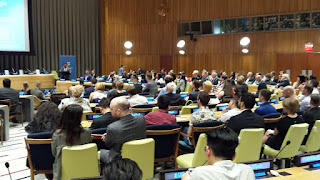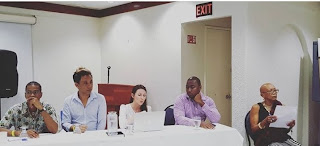Report of Draft Resolution Process in Cochabamba
31st, May, 2012
Below is a draft resolution on Human Rights, Sexual Oreintation and Gender Identity. What we have learnt is that the Holy See sought to weaken this resolution by encouraging Peru to modify it with reference to marriage between a man and a woman. The goal it seems was to weaken support among member states. What we learnt is that six countries supported the resolution, this included Urugauy, Costa Rica, Salvador, Argentina, US, and Canada. The Caribbean region did not work to block the resolutions in anyway, like in pass years, but interestingly enough, Costa Rica, a conservative country is a sponsor of the resolution. The process of support or sponsorship is important because the process by the OAS is about decisions by consensus. Highlighted are the important areas of concerns which I believe is achieveable in advocating for systematic change of rights enforcement. I must note that while we have used one of the resolution as evidence in our legal challenge we have not circulated it to our partners and the community at large. For us the, resolution is an opportunity to do many things.
Beyond this,today, we had the chance to meet a Bolivian congressmen as well named Saul Garabito to engaged him on LGBT concerns. Mostly, the meeting was to support our Bolivian counterparts as they move to advance their bill on transgender protections. Beyond this, please see, partial draft resolution below to be passed at the general assembly with writing highlighted in Red for what is considered the i important parts.
THE GENERAL ASSEMBLY,
RESOLVES:
2. To encourage member states to consider, within the parameters of the legal institutions of their domestic systems, adopting public policies against discrimination by reason of sexual orientation and gender identity.
3. To condemn acts of violence and human rights violations committed against persons by reason of their sexual orientation and gender identity; and to urge states to strengthen their national institutions with a view to preventing and investigating these acts and violations and ensuring due judicial protection for victims on an equal footing and that the perpetrators are brought to justice.
<>
7. To urge the member states that have not yet done so to consider signing,ratifying, or acceding to, as the case may be, the inter-American human rights instruments.
8. To request the Permanent Council to report to the General Assembly on the implementation of this resolution. Execution of the activities envisaged in this resolution will be subject to the availability of financial resources in the program-budget of the Organization and other resources.
Report of Draft Resolution Process in Cochabamba
Below is a draft resolution on Human Rights, Sexual Oreintation and Gender Identity. What we have learnt is that the Holy See sought to weaken this resolution by encouraging Peru to modify it with reference to marriage between a man and a woman. The goal it seems was to weaken support among member states. What we learnt is that six countries supported the resolution, this included Urugauy, Costa Rica, Salvador, Argentina, US, and Canada. The Caribbean region did not work to block the resolutions in anyway, like in pass years, but interestingly enough, Costa Rica, a conservative country is a sponsor of the resolution. The process of support or sponsorship is important because the process by the OAS is about decisions by consensus. Highlighted are the important areas of concerns which I believe is achieveable in advocating for systematic change of rights enforcement. I must note that while we have used one of the resolution as evidence in our legal challenge we have not circulated it to our partners and the community at large. For us the, resolution is an opportunity to do many things.
Beyond this,today, we had the chance to meet a Bolivian congressmen as well named Saul Garabito to engaged him on LGBT concerns. Mostly, the meeting was to support our Bolivian counterparts as they move to advance their bill on transgender protections. Beyond this, please see, partial draft resolution below to be passed at the general assembly with writing highlighted in Red for what is considered the i important parts.
DRAFT RESOLUTION-May 23, 2012
(Presented by the Permanent Mission of Brazil,
co-sponsored by the
Permanent Missions of Argentina,Canada ,
Costa Rica , El Salvador , the United
States , and Uruguay
and approved by the CAJP on May 8, 2012)
Permanent Missions of Argentina,
and approved by the CAJP on May 8, 2012)
TAKING
INTO ACCOUNT resolutions AG/RES. 2435 (XXXVIII-O/08), AG/RES. 2504
(XXXIX-O/09), AG/RES. 2600 (XL-O/10), and AG/RES. 2653 (XLI-O/11), “Human
Rights, Sexual Orientation, and Gender Identity”;.......
RESOLVES:
1. To condemn discrimination against
persons by reason of their sexual orientation and gender identity; and to urge
the states within the parameters of the legal institutions of their domestic
systems to eliminate, where they exist, barriers faced by lesbians, gays, and
bisexual, transsexual, and intersex (LGBTI) persons in access to political
participation and in other areas of public life.
2. To encourage member states to consider, within the parameters of the legal institutions of their domestic systems, adopting public policies against discrimination by reason of sexual orientation and gender identity.
3. To condemn acts of violence and human rights violations committed against persons by reason of their sexual orientation and gender identity; and to urge states to strengthen their national institutions with a view to preventing and investigating these acts and violations and ensuring due judicial protection for victims on an equal footing and that the perpetrators are brought to justice.
6.To request the IACHR to prepare a study on
legislation and provisions in force in the OAS member states restricting the
human rights of individuals by reason of their sexual orientation or gender
identity and to prepare, based on that study, guidelines aimed at promoting the
decriminalization of homosexuality.
7. To urge the member states that have not yet done so to consider signing,ratifying, or acceding to, as the case may be, the inter-American human rights instruments.
8. To request the Permanent Council to report to the General Assembly on the implementation of this resolution. Execution of the activities envisaged in this resolution will be subject to the availability of financial resources in the program-budget of the Organization and other resources.





Comments
Post a Comment